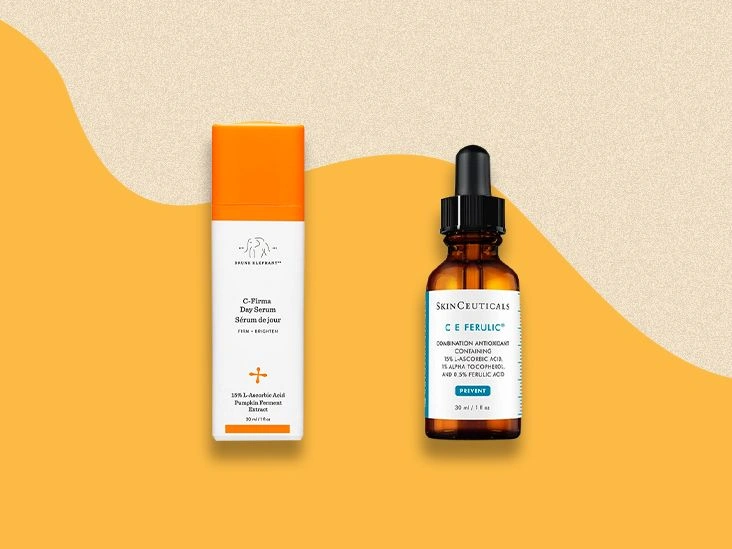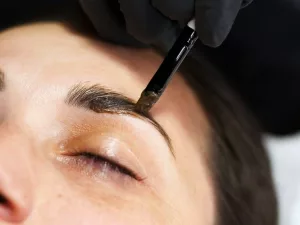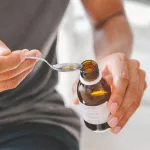- A splurge people swear by: | Skip to review
- A comparable option at half the cost: | Skip to review
- Best for sensitive skin: | Skip to review
- Best for acne-prone skin: | Skip to review
- Best under $30: | Skip to review
Whether you’re aiming to streamline your skincare regimen or give it a boost, a vitamin C serum could be the answer. Topical vitamin C is a versatile powerhouse that helps protect, repair, and enhance the complexion.
You may be poised to purchase, but picking a vitamin C serum that truly benefits your skin takes a bit of homework. We reviewed the research to offer some informed suggestions.
Vitamin C serum benefits and when to apply it

Vitamin C functions as an antioxidant, meaning it halts or slows environmental and UV damage to cells. It offers photoprotective effects and reduces oxidative stress caused by free radicals encountered during the day — think vehicle emissions, cigarette smoke, certain chemicals, even alcohol and highly processed foods.
While a morning glass of orange juice supports overall health, the most effective way to deliver vitamin C’s benefits to skin is topical application.
That’s because when we ingest vitamin C (ascorbic acid) through food, drink, or supplements, only a fraction reaches the skin. Applying vitamin C in serum form, after appropriate formulation, allows the skin to absorb it more efficiently.
There’s also a reason you shouldn’t simply press citrus slices on your face: DIY methods lack quality control and can sometimes be unsafe.
When to apply vitamin C serum
Use vitamin C serum in the morning and at night, after cleansing and toning — if your skin tolerates twice-daily use.
One 2013 review even suggests applying vitamin C every 8 hours, or twice daily, for optimal protection.
Vitamin C’s antioxidant protection diminishes over time, but you can maintain a reservoir for sustained photoprotection by applying regularly, such as every 8 hours.
Also, UV exposure reduces the skin’s vitamin C stores. The same 2013 review notes that topical vitamin C is best used after UV exposure, not beforehand.
Always use SPF with vitamin CVitamin C serum is not a replacement for sunscreen (in fact, sun sensitivity can increase with use), but used together they enhance the skin’s defense against damage.
What to look for in a vitamin C serum

Vitamin C serums can be an area where you might spend more than you expect. It’s not unusual to find serums priced over $100, so it pays to research before you buy.
Not all serums are equal. Factors such as the form and concentration of vitamin C, the rest of the ingredients, and even the packaging affect a serum’s performance — and how your skin responds.
Form
Vitamin C appears on ingredient lists under several names, but the one to seek is L-ascorbic acid, the most studied and effective form.
Try to find this key ingredient near the top of the label, ideally among the first five listed.
Concentration
The ideal concentration range is roughly 10% to 20%. Levels above 8% tend to offer stronger effects, but exceeding about 20% can increase irritation without adding benefit.
Higher percentages of L-ascorbic acid can be too harsh for some skin types, provoking purging, breakouts, or itching. You don’t want persistent stinging even after applying moisturizer.
Patch test with high percentagesVitamin C is generally safe, but occasionally it may cause stinging, redness, dryness, or a yellowish tint. As with any new product, perform a patch test before applying broadly.
Ingredients
Look for vitamin C paired with vitamin E (tocopherol). These antioxidants work synergistically.
Vitamin E helps stabilize vitamin C for better skin protection. Another helpful antioxidant is glutathione.
Also check for ferulic acid, which helps lower vitamin C’s pH to below the level where skin can best absorb it.
Packaging
Air, light, and heat can degrade your serum. Opt for products in dark glass bottles with droppers rather than air pumps when feasible.
A tube is also acceptable. Some brands recommend refrigerating the serum to extend shelf life. A thoughtful company will include storage directions on the label.
Expiration timeMany serums are yellow, but if yours turns brown or deep orange, discard it — it’s gone bad. If a clear serum becomes yellow, that’s a sign of oxidation and reduced potency.
Price
Concentration and formulation determine a vitamin C serum’s quality more than cost. Prices range from about $25 to well over $100.
Why L-ascorbic acid is important for brighter skin
There are several forms of vitamin C in skincare, and L-ascorbic acid is one you should prioritize.
L-ascorbic acid is a naturally occurring organic compound used in topical vitamin C products, including powders, oils, and serums. It’s helpful for improving:
- fine lines
- wrinkles
- hyperpigmentation
- dark spots
- acne scars
The term “L-ascorbic” describes the chemical orientation of this vitamin C form and how it reacts to light. You may recognize ascorbic acid from oral supplements, but L-ascorbic acid is named based on its optical rotation when exposed to light.
Vitamin C variants include synthetic and natural types. L-ascorbic acid is derived from natural sources and is found in fruits, vegetables, and human skin. The epidermis has particularly high levels of this compound.
L-ascorbic acid is reliable because it’s well researched. It’s among the most trusted actives in skincare. L-ascorbic acid stands out because it’s considered an active form.
Because L-ascorbic acid is naturally present in skin, it’s bioavailable (ready for immediate use). The downside is its instability, meaning it can oxidize before penetrating the skin.
Other topical vitamin C forms may be more stable but are inactive until converted into L-ascorbic acid in the skin.
Which vitamin C serums should you avoid?Research indicates that concentrations above 20% do not improve outcomes and can increase irritation.
If your skin is dry, dehydrated, sensitized, or sensitive, choose lower-strength vitamin C products (under 20% L-ascorbic acid), especially if you plan to use them twice daily.
What about powder to DIY my own vitamin C benefits?
Have a crowded skincare shelf? You can add a pinch of vitamin C powder to an existing serum or moisturizer.
You’ve probably seen C powders like The Ordinary’s L-Ascorbic Acid powder (100% ascorbic acid). Or you can buy food-grade ascorbic acid powder, such as NutriBiotic, for less.
Pros of vitamin C powdersCons of vitamin C powdersinexpensive if bought as a supplementnot as convenient (needs mixing)adjustable dose (add more or less to moisturizer or DIY serum)could irritate at high concentrationslonger shelf life in powder formmay not remain sanitary over time
Remember that combining vitamin C with ingredients like vitamin E and ferulic acid stabilizes it and improves skin uptake.
So, mixing your own in the bathroom may not yield the same results as a purpose-formulated serum. But if you enjoy DIY, you can use a powder to make an affordable homemade serum with the right supporting components.
Whatever format or brand you choose, vitamin C remains one of the most evidence-backed ingredients for skin. You don’t need an expensive product to enjoy vitamin C’s benefits.
How to use vitamin C serum
Vitamin C can interact with certain actives and some forms are unstable. To maximize your serum’s benefits, follow these steps:
- Wash your face: Start with clean skin so the serum won’t mix with dirt or oils.
- Use a toner or essence to balance pH: Avoid toners that contain other acids or exfoliants.
- Apply vitamin C to face, neck, and chest: Prefer serums that also include vitamin E and ferulic acid to increase L-ascorbic acid’s stability and effectiveness.
- Moisturize to seal in protection: Avoid pairing immediately with creams that contain retinol.
- Apply sunscreen: Vitamin C can raise sun sensitivity, so always finish with SPF in the daytime.
Frequently asked questions
Is L-ascorbic acid the same as vitamin C?
L-ascorbic acid is a form of vitamin C. It’s naturally derived and present in human skin. Although it can be unstable, it’s an active, bioavailable type ready for immediate use.
Are there any side effects of using vitamin C serums?
High-strength vitamin C serums can cause irritation. Vitamin C may react with other actives like retinol and certain acids. It can also increase sunlight sensitivity, so always wear sunscreen after applying vitamin C.
Should I use vitamin C serum in the morning or at night?
You can apply vitamin C any time of day, ideally both morning and night if tolerated. It’s particularly useful at night when skin repair is active.
If you use retinol at night, reserve vitamin C for daytime use only. Do not mix the two. Applying vitamin C in the morning is still beneficial because it complements SPF protection — always follow with sunscreen when used during the day.
Should I use vitamin C serum before or after moisturizer?
Apply vitamin C serum before moisturizer, face oil, and sunscreen. You can use cleanser and toner prior to your vitamin C serum.
Takeaway
Most people can benefit from adding a vitamin C serum to their skincare routine. L-ascorbic acid, in particular, is a well-researched active with antioxidant effects. Though it’s unstable, it’s bioavailable and highly valued in cosmetics.
Using a vitamin C serum offers many advantages. The antioxidant counters free radicals from pollution, UV exposure, and harsh weather. Apply a vitamin C serum to brighten skin — pair it with vitamin E, ferulic acid, and SPF for optimal results.
























Leave a Reply
You must be logged in to post a comment.